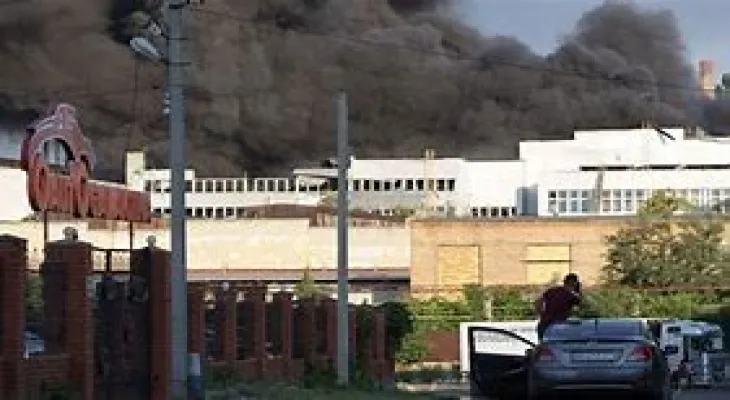Search here
Newspaper
Search here

Arab Canada News
News

Published: July 20, 2023
Russia bombed Ukrainian southern cities today, Thursday, with drones and missiles for the third consecutive night, targeting some of the country's vital grain export infrastructure and contributing to rising food prices in countries facing hunger.
At least two people were killed in the besieged coastal city of Odesa in the strikes that came days after President Vladimir Putin withdrew Russia from a wartime agreement that allowed Ukraine to send grain to some needy countries.
The attacks followed Moscow's vow to retaliate earlier this week for an attack that damaged an important bridge between Russia and the annexed Crimean Peninsula, with Russian officials blaming that strike on Ukrainian drones.
Odesa Governor Oleh Kiper stated that Ukrainian air defenses destroyed all Iranian-made Shahed drones and two Kalibr missiles targeting Odesa.
However, he added that the air defense systems were unable to shoot down some incoming missiles, particularly types like X-22, and did not mention how many missiles hit their targets, while the Russian military described its strikes on the city of Odesa in southern Ukraine as retaliatory.
The Russian Ministry of Defense stated in a statement that it targeted production facilities and storage sites for unmanned boats in Odesa and the nearby city of Chornomorsk.
In the Mykolaiv region, the Russian military claimed to have destroyed fuel infrastructure facilities and ammunition warehouses in Ukraine, but it was not possible to independently verify the claims of either side.
Kiper stated that the two individuals who died in Odesa were a 21-year-old security guard and another person found dead under the rubble during a search and rescue operation, adding that the strikes destroyed administrative and residential buildings near the port.
In Mykolaiv, another southern city near the Black Sea, at least 19 people were injured overnight, according to regional governor Vitaliy Kim in a Telegram statement, with the Russian strikes partially destroying one building and igniting a large fire, and two people, including one child, were hospitalized.
The night before, heavy Russian shelling using drones and missiles damaged the critical infrastructure of ports in Odesa, including grain and oil terminals, with the attack destroying at least 60,000 tons of grain.
The European Union's foreign affairs chief condemned Russia's targeting of grain storage facilities.
Josep Borrell said in Brussels on Thursday, "Regarding Moscow's latest tactics, not only are they withdrawing from the grain agreement, but they are burning grain, with over 60,000 tons of grain having been burned."
German Foreign Minister Annalena Baerbock said at the same meeting that the EU is engaged in international efforts to deliver Ukrainian grain to the global market.
She added, "The fact that the Russian president has canceled the grain agreement and is now bombing Odesa port is not just another attack on Ukraine, but an attack on people, on the poorest people in the world, with hundreds of thousands, even millions, desperately needing grain from Ukraine."
The White House warned on Wednesday that Russia is preparing for potential attacks on civilian shipping vessels in the Black Sea, and this warning may raise concerns for shippers and further increase grain prices.
White House National Security Council spokesman Adam Hodge stated in a statement, "Russia has placed additional naval mines near Ukrainian ports, we believe this is a coordinated effort to justify any attacks against civilian ships in the Black Sea and blame Ukraine for these attacks."
Carlos Mira, head of agricultural commodity markets at Rabobank, stated, "Wheat prices rose by about 17% last week, describing it as a sudden increase that started even before the grain deal expired on Monday and attributed it to a bit of panic."
He noted that much of the wheat exported from Ukraine goes to extremely poor countries like those in North Africa, and people in those places are already suffering from food insecurity and rising local food prices, while, at the same time, Russia has exported record amounts of wheat in recent months despite complaints about hindering its agricultural exports.
Mira explained that there is a broad list of countries that depend on Ukrainian and Russian wheat, and with rising prices, people will have to pay more for this wheat, which means more expensive bread in those countries.
Russia has bombed Ukrainian towns and cities since the beginning of the war in February 2022, and Ukraine's Western allies have helped update Ukrainian air defense systems, with the latest military aid package from the United States, announced by the Pentagon on Wednesday, funding four advanced national surface-to-air missile systems and munitions for them.
In the Russian-annexed Crimea region, an enemy drone attacked a settlement in the northwest part of the peninsula, clearly indicating Ukraine, according to the Moscow-appointed regional governor Sergei Aksyonov on Thursday, who said the attack damaged several administrative buildings and killed a teenage girl.
Comments